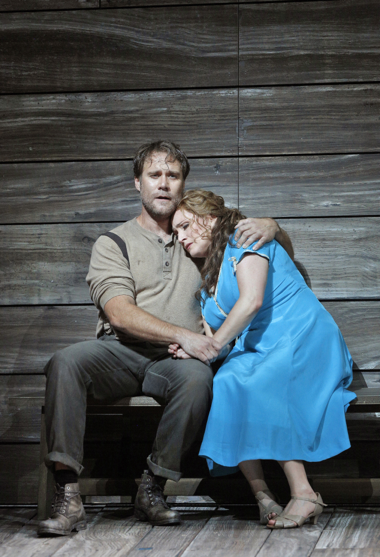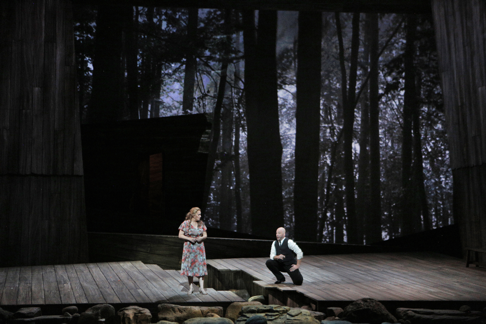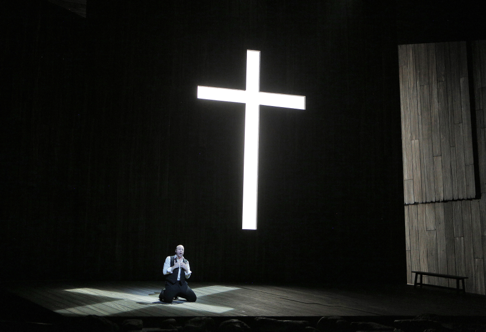
18 Sep 2014
Susannah in San Francisco
Come to think of it the 1950‘s were operatically rich years in America compared to other decades in the recent past. Just now the San Francisco Opera laid bare an example, Carlisle Floyd’s Susannah.
English Touring Opera are delighted to announce a season of lyric monodramas to tour nationally from October to December. The season features music for solo singer and piano by Argento, Britten, Tippett and Shostakovich with a bold and inventive approach to making opera during social distancing.
This tenth of ten Live from London concerts was in fact a recorded live performance from California. It was no less enjoyable for that, and it was also uplifting to learn that this wasn’t in fact the ‘last’ LfL event that we will be able to enjoy, courtesy of VOCES8 and their fellow vocal ensembles (more below …).
Ever since Wigmore Hall announced their superb series of autumn concerts, all streamed live and available free of charge, I’d been looking forward to this song recital by Ian Bostridge and Imogen Cooper.
The Sixteen continues its exploration of Henry Purcell’s Welcome Songs for Charles II. As with Robert King’s pioneering Purcell series begun over thirty years ago for Hyperion, Harry Christophers is recording two Welcome Songs per disc.
Although Stile Antico’s programme article for their Live from London recital introduced their selection from the many treasures of the English Renaissance in the context of the theological debates and upheavals of the Tudor and Elizabethan years, their performance was more evocative of private chamber music than of public liturgy.
In February this year, Albanian soprano Ermonela Jaho made a highly lauded debut recital at Wigmore Hall - a concert which both celebrated Opera Rara’s 50th anniversary and honoured the career of the Italian soprano Rosina Storchio (1872-1945), the star of verismo who created the title roles in Leoncavallo’s La bohème and Zazà, Mascagni’s Lodoletta and Puccini’s Madama Butterfly.
Evidently, face masks don’t stifle appreciative “Bravo!”s. And, reducing audience numbers doesn’t lower the volume of such acclamations. For, the audience at Wigmore Hall gave soprano Elizabeth Llewellyn and pianist Simon Lepper a greatly deserved warm reception and hearty response following this lunchtime recital of late-Romantic song.
Collapsology. Or, perhaps we should use the French word ‘Collapsologie’ because this is a transdisciplinary idea pretty much advocated by a series of French theorists - and apparently, mostly French theorists. It in essence focuses on the imminent collapse of modern society and all its layers - a series of escalating crises on a global scale: environmental, economic, geopolitical, governmental; the list is extensive.
For this week’s Live from London vocal recital we moved from the home of VOCES8, St Anne and St Agnes in the City of London, to Kings Place, where The Sixteen - who have been associate artists at the venue for some time - presented a programme of music and words bound together by the theme of ‘reflection’.
'Such is your divine Disposation that both you excellently understand, and royally entertaine the Exercise of Musicke.’
Amongst an avalanche of new Mahler recordings appearing at the moment (Das Lied von der Erde seems to be the most favoured, with three) this 1991 Mahler Second from the 2nd Kassel MahlerFest is one of the more interesting releases.
‘And there was war in heaven: Michael and his angels fought against the dragon; and the dragon fought and his angels, And prevailed not; neither was their place found any more in heaven … that old serpent … Satan, which deceiveth the whole world: he was cast out into the earth, and his angels were cast out with him.’
If there is one myth, it seems believed by some people today, that probably needs shattering it is that post-war recordings or performances of Wagner operas were always of exceptional quality. This 1949 Hamburg Tristan und Isolde is one of those recordings - though quite who is to blame for its many problems takes quite some unearthing.
There was never any doubt that the fifth of the twelve Met Stars Live in Concert broadcasts was going to be a palpably intense and vivid event, as well as a musically stunning and theatrically enervating experience.
‘Love’ was the theme for this Live from London performance by Apollo5. Given the complexity and diversity of that human emotion, and Apollo5’s reputation for versatility and diverse repertoire, ranging from Renaissance choral music to jazz, from contemporary classical works to popular song, it was no surprise that their programme spanned 500 years and several musical styles.
The Academy of St Martin in the Fields have titled their autumn series of eight concerts - which are taking place at 5pm and 7.30pm on two Saturdays each month at their home venue in Trafalgar Square, and being filmed for streaming the following Thursday - ‘re:connect’.
The London Symphony Orchestra opened their Autumn 2020 season with a homage to Oliver Knussen, who died at the age of 66 in July 2018. The programme traced a national musical lineage through the twentieth century, from Britten to Knussen, on to Mark-Anthony Turnage, and entwining the LSO and Rattle too.
With the Live from London digital vocal festival entering the second half of the series, the festival’s host, VOCES8, returned to their home at St Annes and St Agnes in the City of London to present a sequence of ‘Choral Dances’ - vocal music inspired by dance, embracing diverse genres from the Renaissance madrigal to swing jazz.
Just a few unison string wriggles from the opening of Mozart’s overture to Le nozze di Figaro are enough to make any opera-lover perch on the edge of their seat, in excited anticipation of the drama in music to come, so there could be no other curtain-raiser for this Gala Concert at the Royal Opera House, the latest instalment from ‘their House’ to ‘our houses’.
"Before the ending of the day, creator of all things, we pray that, with your accustomed mercy, you may watch over us."

Come to think of it the 1950‘s were operatically rich years in America compared to other decades in the recent past. Just now the San Francisco Opera laid bare an example, Carlisle Floyd’s Susannah.
It is an opera some of us may now find to be a naive or simplistic artifact, nevertheless emblematic of those years.
Vanessa (1957), West Side Story (1957), The Saint of Bleecker Street (1955), and Susannah (1956) are the survivors from that decade. Like Vanessa, Susannah is a morbid short story though Vanessa is urban, subtle and twisted while Susannah is rural, obvious and brutal. At first Susannah may seem a bit like verismo, Cavalleria Rusticana for example, but it lacks the single physical blow and emotional resolution, dissolving instead into a sea of musically unsupported judgmental ironies.
Like West Side Story, Susannah is musical theater moreso than it is pure opera. It is a series of relatively brief, showy musical numbers that each illustrate a single emotion or situation. Its few action scenes are in elaborated recitative that is not integrated into larger musical structures.
West Side Story and The Saint of Bleecker Street are urban Americana composed by sophisticated New Yorkers (Bernstein and Menotti). These were the plights of poor immigrant Americans with strong ethnic accents, and music that eschewed the then current European complex serialism in favor of popular idioms and traditional forms.
Susannah composer Carlisle Floyd was born in South Carolina. He was a tenured professor at Florida State University and later founded the Houston Opera Studio. He writes about the American south (both words and music) in verbal declaration for which a strong regional accent is taken for granted. His musical idiom combines easy flowing tonal music with a big folksy overlay (hymns and mountain tunes) spiced with a bit of glowing dissonance.
Susannah may be the second most performed American opera but there is an immense gulf between the artistic intelligence and power of Porgy and Bess and the blatant moralism of Susannah.
Neither Gian Carlo Menotti nor Carlisle Floyd pushed the artistic envelope sufficiently to be discussed in Alex Ross’ history of music in the twentieth century, The Rest is Noise (2007). But make no mistake, along with these other works Susannah too is an operatic masterpiece in its way, and it is a quite modest way.
 Patricia Racette as Susannah, Raymond Aceto as Blitch
Patricia Racette as Susannah, Raymond Aceto as Blitch
Susannah was composed for the reduced circumstances of post WWII and as a populist work of art consistent with the socialistic artistic politic of the time. Premiered in Florida it quickly made its way first to the New York City Opera, “the people’s opera” and then to the 1958 Brussels World’s Fair where it represented American culture. One can only question the wisdom behind the choice of specific, ugly content to portray American life to the world at large.
Just now San Francisco Opera rolled out a handsome new production that filled the War Memorial Stage. Canadian stage director Michael Cavanagh with his designer Erhard Rom created splendidly realistic expanses of southern mountains with scrims and projections. These lovely photographic impressions of nature were at odds with a modernistic cross, a huge, neon lighted (it seemed) cross typical of modern suburban mega churches that loom over the revival meetings. It screamed naiveté of concept.
 Roaymond Aceto as Reverend Blitch
Roaymond Aceto as Reverend Blitch
A similar conflict arose in the stage direction, Mr. Cavanagh alternated between the presentational naturalism of the hayseed presences of Susannah, her brother Sam and the church elders, and clumsy solutions to managing the presentational needs of the crowd scenes at the picnics and in the church. Also clumsy were the several times a character was asked to silently act out conflicting emotions while we musically waited from him to make up his mind. Mr. Cavanagh is less to blame for these unsuccessful moments than Carlisle Floyd.
Soprano Patricia Racette, long a Carlisle Floyd heroine, still pulls it off, even in this latter day essay as Susannah. Because la Racette is usually associated with the great roles in the grand repertory it seems a waste to cast her in such simple music. The same can be said of tenor Brandon Jovanovich who gave us a superb Sam, Susannah’s brother, his performance utilizing but a tiny percentage of his capability (Lohengrin in 2012 for example). Of the three principals only bass Raymond Aceto as the Reverend Blitch did not find an un-self conscious Americana presence, his performance was purely big house look-at-me opera singing and acting. The smaller roles were well cast.
This little opera can pack quite a wallop in the right circumstances. Susannah simply does not blow up to grand opera proportions.
Michael Milenski
Casts and production information:
Susannah Polk: Patricia Racette; Sam Polk: Brandon Jovanovich; Rev. Olin Blitch: Raymond Aceto; Mrs. Mclean: Catherine Cook; Little Bat Mclean; James Kryshak; Mrs. Hayes: Jacqueline Piccolino; Mrs. Gleaton: Erin Johnson; Mrs. Ott: Suzanne Hendrix; Elder Hayes: Joel Sorensen; Elder Gleaton: A.J. Glueckert; Elder Mclean: Dale Travis; Elder Ott: Timothy Mix. Orchestra and Chorus of the San Francisco Opera. Conductor: Karen Kamensek; Stage Director: Michael Cavanagh: Set Designer: Erhard Rom; Costume Designer: Michael Yeargan; Lighting Designer: Gary Marder. War Memorial Opera House, September 12, 2014, seated seventh row center.